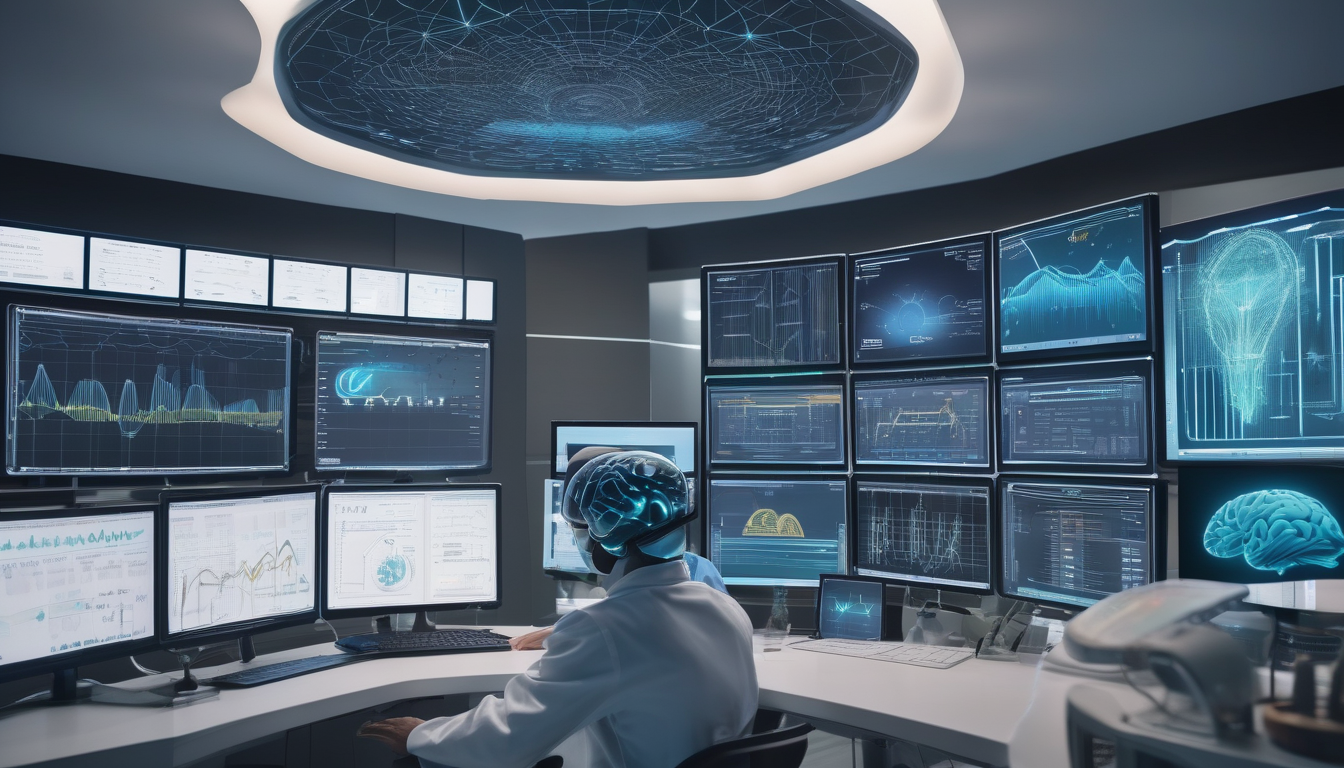Artificial Intelligence (AI) is not just a buzzword; it’s a game-changer in the realm of mental health. Imagine a world where mental health disorders can be diagnosed with pinpoint accuracy, and treatments are tailored specifically for you. This is not a distant dream but a reality that is unfolding right now. By leveraging the power of AI, healthcare professionals are equipped with tools that not only enhance their diagnostic capabilities but also improve patient outcomes significantly.
AI’s potential in mental health extends beyond mere diagnosis. It encompasses a wide array of applications, from predictive analytics that forecast potential mental health issues to personalized treatment plans that adapt to the unique needs of each individual. The integration of AI into mental health care is akin to having a personal assistant who knows your preferences and helps you navigate your mental wellness journey.
Consider the impact of AI-powered diagnostic tools. These innovative solutions assist healthcare providers in identifying mental health disorders more accurately and efficiently. By analyzing vast amounts of patient data, AI can reveal patterns that might elude even the most seasoned professionals. This not only speeds up the diagnosis process but also ensures that patients receive timely interventions, which are crucial in mental health care.
Moreover, the rise of teletherapy platforms utilizing AI is breaking down barriers to access. For individuals in remote areas or those who may feel uncomfortable seeking traditional therapy, AI-enhanced teletherapy offers a lifeline. With personalized treatment options at their fingertips, patients can engage in therapeutic practices that cater to their specific needs, all from the comfort of their own homes.
In summary, the fusion of AI and mental health is paving the way for a future where mental health care is more accurate, accessible, and personalized. As we continue to explore these innovations, it’s essential to remain vigilant about the ethical implications, ensuring that the technology serves all individuals fairly and responsibly.

Understanding AI in Mental Health
Artificial Intelligence (AI) is rapidly transforming the landscape of mental health care, offering innovative solutions that can enhance the way we diagnose and treat mental health conditions. Imagine having a digital assistant that not only understands your emotional state but also helps professionals make informed decisions about your care. This is the power of AI in the realm of mental health.
At its core, AI encompasses a range of technologies, including machine learning, natural language processing, and data analytics. These technologies enable AI systems to analyze vast amounts of data, identify patterns, and provide insights that were previously unimaginable. For instance, AI can sift through thousands of patient records to detect early signs of disorders like depression or anxiety, often before a human clinician might notice.
One of the most exciting possibilities is the use of AI-powered chatbots and virtual therapists. These tools can offer immediate support to individuals in need, providing a safe space to talk about their feelings and receive guidance. This is particularly beneficial for those who may feel uncomfortable seeking help in traditional settings. With the ability to operate 24/7, AI can bridge the gap for individuals who might otherwise go without support.
Furthermore, the application of AI in mental health is not limited to diagnostics. It also extends to treatment options, where personalized therapy plans can be developed based on individual data. For example, AI can analyze a patient’s response to different therapies and recommend adjustments to optimize their treatment. This level of customization is akin to having a tailored suit made just for you, ensuring that every aspect fits perfectly.
As we delve deeper into the capabilities of AI in mental health, it’s essential to keep in mind the potential it holds for enhancing patient outcomes. With improved diagnostics and personalized treatment plans, AI is set to revolutionize the way we approach mental health care. However, as we embrace these advancements, we must remain vigilant about the ethical considerations that accompany their use.

AI-Powered Diagnostic Tools
In today’s fast-paced world, are revolutionizing how we approach mental health. Imagine having a personal assistant that can sift through mountains of data to spot patterns and anomalies that even the most seasoned professionals might miss. These tools leverage the power of artificial intelligence to assist healthcare providers in diagnosing mental health disorders with unprecedented accuracy and speed.
One of the standout features of these tools is their ability to analyze vast amounts of patient data. By employing machine learning algorithms, they can identify trends and predict potential mental health issues before they escalate. This proactive approach is akin to having a weather forecast for mental wellness, allowing for timely interventions that can significantly improve patient outcomes.
Machine learning algorithms are the backbone of these diagnostic tools. They learn from historical data, continuously refining their predictions as they process new information. This means that the more data they analyze, the smarter they become. For instance, a tool might recognize that a combination of certain symptoms tends to correlate with conditions like anxiety or depression, enabling healthcare providers to tailor their treatment plans more effectively.
To harness the full potential of AI in mental health diagnostics, effective data collection methods are crucial. Gathering diverse and representative datasets ensures that AI systems can accurately reflect the complexities of human behavior and mental health conditions. This is similar to how a chef needs a variety of ingredients to create a well-balanced dish; without the right data, the AI’s insights can be skewed and ineffective.
Integrating AI into clinical decision-making processes can greatly enhance the speed and accuracy of diagnoses. Imagine walking into a clinic and receiving a diagnosis based on data-driven insights almost immediately. This not only empowers mental health professionals to make informed decisions but also fosters a collaborative environment where technology and human expertise work hand in hand. The result? A more efficient healthcare system that prioritizes patient well-being.
Machine Learning Algorithms
When we talk about in the context of mental health, we’re diving into a world where technology meets human emotion. These algorithms are like the brain’s little helpers, analyzing vast amounts of data to find patterns that might go unnoticed by even the most trained professionals. Imagine having a super-smart assistant who can sift through mountains of patient information, identifying potential mental health issues before they escalate. Isn’t that a game-changer?
These algorithms leverage the power of big data to enhance diagnostic accuracy. For instance, when a patient shares their symptoms, machine learning models can compare this data with thousands of similar cases, predicting possible outcomes and suggesting tailored treatment plans. This level of personalization is crucial in mental health, where every individual’s experience is unique.
To illustrate how machine learning algorithms work, consider the following table that outlines their key functions:
| Function | Description |
|---|---|
| Data Analysis | Analyzes patient data to identify trends and patterns. |
| Predictive Modeling | Predicts potential mental health issues based on historical data. |
| Personalized Treatment | Recommends tailored treatment plans suited to individual needs. |
Moreover, the integration of these algorithms into mental health practices can significantly enhance clinical decision-making. By providing mental health professionals with data-driven insights, they can make informed choices that lead to better patient outcomes. Just think about it: instead of relying solely on intuition or experience, practitioners can now utilize the power of AI to back their decisions. This synergy between human expertise and machine efficiency is paving the way for a brighter future in mental health care.
Data Collection Methods
When it comes to harnessing the power of artificial intelligence in mental health, the importance of effective data collection methods cannot be overstated. These methods are the backbone of AI systems, ensuring that they are trained on diverse and representative datasets. Imagine trying to solve a complex puzzle without all the pieces; that’s what AI would be facing without robust data collection strategies.
There are several techniques employed in gathering data for AI applications in mental health. One common approach is the use of electronic health records (EHRs). These records provide a wealth of information about patients’ mental health histories, treatment responses, and demographic details. By analyzing this data, AI can identify patterns that might not be visible to human clinicians alone. Additionally, surveys and questionnaires are frequently utilized to collect self-reported data from patients, offering insights into their mental states and experiences.
Moreover, wearable technology has emerged as a revolutionary tool in data collection. Devices that monitor physiological indicators—such as heart rate variability or sleep patterns—can provide real-time data that enhances the understanding of a patient’s mental health. This data can be crucial for predicting episodes of anxiety or depression before they escalate. To illustrate the range of data collection methods, consider the following table:
| Data Collection Method | Description | Benefits |
|---|---|---|
| Electronic Health Records | Digital versions of patients’ paper charts | Comprehensive historical data |
| Surveys and Questionnaires | Structured tools for self-reporting | Direct insights from patients |
| Wearable Technology | Devices that track physiological metrics | Real-time monitoring and predictions |
Ultimately, these data collection methods are not just about gathering information; they are about empowering AI systems to make informed decisions that can lead to better outcomes for patients. As we continue to refine these processes, the potential for AI to revolutionize mental health diagnosis and treatment becomes increasingly tangible.
Impact on Clinical Decision-Making
The integration of artificial intelligence (AI) into clinical decision-making is nothing short of a game-changer for mental health professionals. Imagine having a tool that not only processes vast amounts of patient data but also delivers insights that can enhance the accuracy of diagnoses. This is the reality that AI brings to the table, allowing clinicians to make informed decisions based on real-time data analysis.
One of the most remarkable aspects of AI in this context is its ability to identify patterns that might go unnoticed by the human eye. For instance, machine learning algorithms can analyze historical patient data to predict potential mental health issues before they escalate. This proactive approach not only improves patient outcomes but also fosters a more personalized treatment plan tailored to individual needs.
Moreover, AI systems can assist in triaging patients by evaluating the severity of their conditions. This means that mental health professionals can prioritize cases that need immediate attention, ensuring that those in crisis receive the care they require without unnecessary delays. The speed and accuracy provided by AI can dramatically reduce the time spent on administrative tasks, allowing clinicians to focus more on patient interaction and care.
However, it’s crucial to acknowledge that while AI enhances clinical decision-making, it should not replace the human touch in therapy. The emotional intelligence, empathy, and understanding that a mental health professional brings to the table are irreplaceable. AI serves as a powerful ally, augmenting the capabilities of clinicians rather than overshadowing them.
In summary, the impact of AI on clinical decision-making is profound. It not only streamlines processes but also enhances the overall quality of care provided to patients. As we continue to embrace these technologies, the future of mental health treatment looks brighter than ever, making it essential for healthcare providers to stay informed and adaptable in this rapidly evolving landscape.
Teletherapy and AI
In today’s fast-paced world, accessibility to mental health services has become more crucial than ever. This is where teletherapy steps in, and when combined with artificial intelligence (AI), it opens up a realm of possibilities for individuals seeking help. Imagine being able to connect with a therapist from the comfort of your home, all while benefiting from the precision of AI-driven tools that enhance the therapeutic experience.
Teletherapy platforms utilizing AI are not just a trend; they are a revolution in mental health care. These platforms employ sophisticated algorithms to analyze user interactions, providing therapists with valuable insights into their patients’ emotional states. This means that therapy can be more personalized and responsive. For instance, if a patient’s mood dips, the AI can alert the therapist, allowing for timely interventions.
Moreover, the integration of AI in teletherapy can address several challenges:
- Scalability: AI can help therapists manage a larger patient load by automating routine tasks, allowing them to focus on what truly matters—patient care.
- Personalization: Through data analysis, AI can suggest tailored treatment plans based on individual needs, making therapy more effective.
- Accessibility: For those in remote areas or with mobility issues, teletherapy powered by AI offers a lifeline, ensuring that mental health support is just a click away.
As we look to the future, the collaboration between teletherapy and AI promises to reshape mental health treatment. With continuous advancements in technology, we can expect even more innovative solutions that will not only enhance patient engagement but also improve overall outcomes. The question remains: are we ready to embrace this digital revolution in mental health?

Ethical Considerations in AI
The rise of artificial intelligence in mental health care brings with it a host of ethical considerations that cannot be overlooked. As we embrace these technologies, it’s crucial to examine how they impact patient privacy, data security, and the potential for bias in treatment outcomes. After all, can we really trust machines with our most personal struggles?
One of the most pressing issues is privacy and data security. With AI systems analyzing sensitive patient information, the risk of data breaches becomes a significant concern. Imagine sharing your deepest fears and vulnerabilities, only to find out that this information has been compromised. Healthcare providers must implement robust security measures to protect patient data, ensuring that confidentiality is maintained at all costs. This is not just about compliance; it’s about building trust between patients and providers.
Moreover, we must address algorithmic bias. AI systems learn from data, and if that data is skewed or unrepresentative, the outcomes can be detrimental. For instance, if an AI algorithm is primarily trained on data from one demographic group, it may not effectively serve individuals from diverse backgrounds. This can lead to unequal treatment outcomes, which raises the question: how do we ensure that AI serves everyone fairly? Strategies to mitigate bias include:
- Utilizing diverse datasets for training AI models.
- Regularly auditing algorithms for bias and inaccuracies.
- Involving a diverse group of stakeholders in the development process.
As we look toward the future, the ethical implications of AI in mental health will continue to evolve. It’s essential for the mental health community to engage in ongoing discussions about these issues, ensuring that innovations in AI enhance patient care without compromising ethical standards. After all, the ultimate goal is to use technology to empower individuals, not to put them at risk.
Privacy and Data Security
In the realm of AI in mental health, the importance of privacy and data security cannot be overstated. As mental health professionals increasingly turn to AI technologies for diagnosis and treatment, they handle sensitive patient information that must be protected at all costs. Imagine sharing your most personal thoughts and feelings, only to find out that they were exposed due to a data breach. This is a genuine concern that keeps both patients and providers awake at night.
To safeguard patient data, healthcare providers must implement robust security measures. This involves not only using advanced encryption techniques but also ensuring that all staff members are trained in data protection protocols. The stakes are high; a breach can lead to significant consequences, including legal ramifications and loss of trust from patients.
Moreover, the ethical responsibility of using AI in mental health extends beyond just securing data. It also involves being transparent about how data is collected, used, and stored. Patients deserve to know who has access to their information and how it may be utilized. This transparency builds trust, which is crucial for effective treatment.
Here are some essential strategies for maintaining privacy and security in AI-driven mental health applications:
- Data Encryption: Always encrypt sensitive patient data to prevent unauthorized access.
- Access Controls: Limit access to patient data to only those who need it for treatment.
- Regular Audits: Conduct regular security audits to identify and rectify potential vulnerabilities.
- Patient Consent: Ensure that patients provide informed consent regarding the use of their data.
As we continue to explore the potential of AI in mental health, prioritizing privacy and data security will be essential in fostering a safe and effective therapeutic environment. By addressing these challenges head-on, we can harness the power of AI while protecting what matters most—our patients’ well-being.
Addressing Algorithmic Bias
Algorithmic bias is a significant concern in the realm of artificial intelligence, especially in mental health applications. Imagine a world where the tools designed to help us are inadvertently creating disparities instead. This is not just a hypothetical scenario; it’s a reality that many face when AI systems are trained on non-representative data sets. When algorithms are fed biased information, they can produce skewed results, leading to unequal treatment outcomes. For instance, if an AI system primarily learns from data of a specific demographic, it may fail to accurately diagnose or provide appropriate treatment recommendations for individuals outside that group.
To combat this issue, it’s essential to implement strategies that promote fairness and inclusivity in AI development. One effective approach is to ensure that the training data is diverse and representative of the population it aims to serve. This involves collecting data from various demographics, including different races, genders, and socioeconomic backgrounds. By doing so, we can enhance the AI’s ability to understand and cater to the unique needs of all individuals.
Moreover, continuous monitoring and auditing of AI systems are crucial. Regular assessments can help identify and rectify any biases that may emerge over time. For example, developers could establish a feedback loop where users can report any discrepancies they observe in AI-driven recommendations. This user involvement not only enhances the system’s accuracy but also fosters a sense of trust between patients and technology.
In addition, educating AI developers about the implications of bias is vital. Workshops and training sessions can raise awareness about the ethical responsibilities that come with creating these technologies. By cultivating a mindset focused on equity, developers can make more informed decisions that prioritize patient welfare.
In conclusion, addressing algorithmic bias in AI for mental health is not just a technical challenge; it’s a moral imperative. By prioritizing diversity in data collection, implementing rigorous monitoring, and fostering education among developers, we can work towards a future where AI serves everyone fairly and effectively.

Future Trends in AI and Mental Health
The future of artificial intelligence in mental health is not just bright; it’s practically glowing with potential! As we look ahead, we can expect a wave of innovations that will transform how we diagnose and treat mental health conditions. Imagine a world where AI not only assists therapists but also acts as a personal mental health companion. Sounds intriguing, right?
One of the most exciting trends is the development of predictive analytics. This technology uses vast amounts of data to foresee mental health issues before they escalate. By analyzing patterns in a patient’s behavior, mood, and even social interactions, AI can flag potential problems early on. This proactive approach can lead to timely interventions, which are crucial in mental health care.
Moreover, the integration of natural language processing (NLP) in AI tools is set to revolutionize patient interactions. Imagine chatbots that can understand and respond to emotional cues during conversations. These AI-driven platforms could provide immediate support, guiding users through crises or simply offering a listening ear. This not only enhances accessibility but also reduces the stigma associated with seeking help.
Another trend to watch is the rise of personalized treatment plans. AI algorithms can analyze individual responses to various therapies, helping clinicians tailor treatments to fit each patient’s unique needs. This shift towards personalization could drastically improve patient outcomes, making therapy more effective and engaging.
However, as we embrace these advancements, we must also remain vigilant about the ethical implications. Ensuring that AI tools are transparent and free from bias is critical. The future of AI in mental health should not only enhance care but also uphold the values of fairness and privacy.
In conclusion, the intersection of AI and mental health is brimming with possibilities. From predictive analytics to personalized care, the innovations on the horizon promise to make mental health services more effective and accessible. As we move forward, let’s harness these technologies responsibly to create a healthier future for all.
Frequently Asked Questions
- How is AI transforming mental health diagnosis?
AI is revolutionizing mental health diagnosis by utilizing advanced algorithms to analyze patient data. These tools help healthcare professionals identify mental health disorders more accurately and swiftly, which leads to timely and effective treatment options.
- What role do machine learning algorithms play in mental health?
Machine learning algorithms are crucial in predicting mental health issues by analyzing vast amounts of data. They enhance diagnostic accuracy and help tailor treatment plans to meet individual patient needs, making care more personalized.
- Can AI improve access to mental health services?
Absolutely! AI-powered teletherapy platforms make mental health services more accessible, especially for individuals who may face barriers to traditional therapy. These platforms offer personalized support and treatment options right at your fingertips.
- What are the ethical concerns regarding AI in mental health?
There are several ethical concerns, including privacy and data security issues, as well as potential algorithmic bias. It’s essential to ensure that patient data is protected and that AI systems provide fair and equitable treatment outcomes.
- How can we address algorithmic bias in AI?
To mitigate algorithmic bias, it’s crucial to implement diverse and representative datasets during the training of AI systems. Regular audits and updates can also help ensure that AI remains fair and effective for all users.
- What future trends can we expect in AI and mental health?
Future trends may include even more advanced AI technologies that enhance diagnostic capabilities, improve treatment personalization, and increase accessibility to mental health resources, ultimately leading to better patient care.



